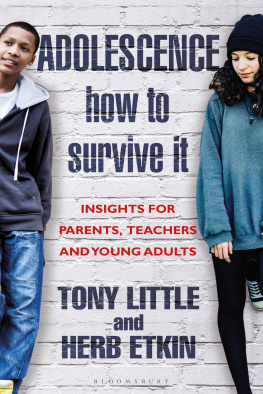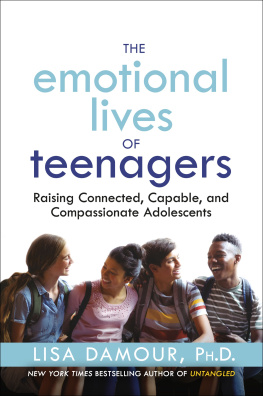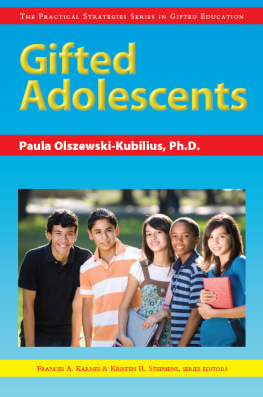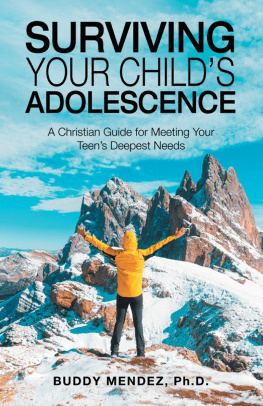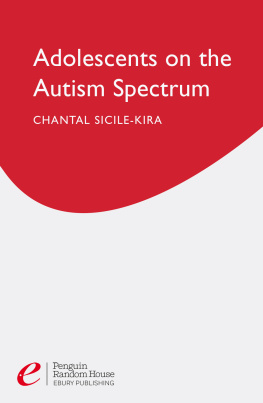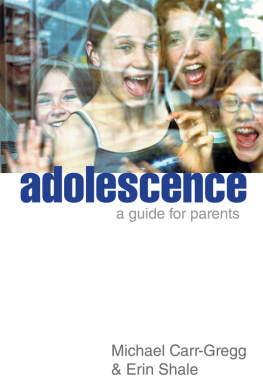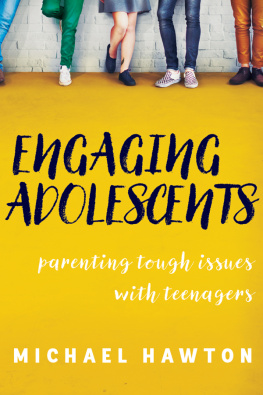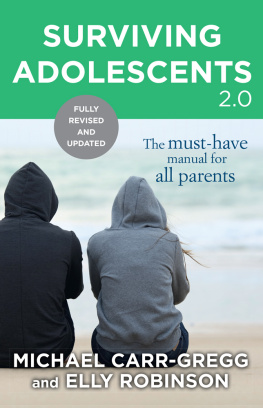

Contents
With our thanks in particular to Jane and Jenny. Also to all the adolescents who have enriched our lives.
And to the adolescent that lingers in all of us!
The Child is Father of the Man
William Wordsworth, My Heart Leaps Up (1807)
Live as long as you may, the first twenty years are the longest half of your life
Robert Southey, The Doctor (1812)
Tony Little
My own adolescence was much like any other. By turns blas and enthusiastic, surly and outgoing, brashly confident and insecure, I had all the bewildering uncertainties and pipe dreams of a typical teenager. Of only one thing was I sure as I looked to the future: that I would never become a teacher.
My family had little history of formal education: the notion of sixth form, let alone university, was wholly alien. If you were lucky enough to have the chance of a good education, that was the route to a better life on an elevated plane, a way up and out. Becoming a teacher didnt fit that vision at all. My father, who left school at 14, said it was a waste of a good opportunity.
I drifted into teaching, as many do. Indeed, some of the best teachers I have known only discovered their vocation on the job after uncertain beginnings. In my case, I developed a growing fascination with the contradictions in front of me: creatures both frustrating and compelling. My wife was an excellent teacher of younger children. I couldnt do that. Somehow I felt more at home with teenage swirls of uncertainty. Their quests for identity and their attempts to make sense of relationships initially seemed like spectres at the feast in my classroom. I always seemed to have to adjust my English teaching to the dynamics of a particular group or an individuals issues. Only later did I realize that this was the point: these things were the feast.
I moved from the classroom to headship, and there had to confront the bigger picture. Plenty of people I met, parents and teachers, treated adolescence as an aberration, a period to be got through as best as one can, before recognizable, mature life begins. It was then I became more aware of just what an exciting time adolescence is: the path pitted with risks and traps, but also with a marvellous appetite to experience new things and an openness thats inspiring. A hugely distinguished television producer told me that every one of his new ideas (which had subsequently been internationally successful) had been initially dismissed as crazy by adults: it was only the 15-year-olds who saw the potential.
For over a quarter of a century I was a head of three British independent schools. Fee-paying schools are privileged places, though rather more diverse these days than some people think. Yet adolescence can be a tricky time, including for those who appear to have all the material comforts they might need. Ive enjoyed close ties with a number of British state schools and have also been responsible for schools around the world, from Shanghai to Kampala, from rural India to urban Europe. Its notable that adolescent problems tend to feature more strongly in more developed societies (theres little time for them when wage-earning to survive starts young), but what really strikes me is that the underlying issues are broadly similar. Adolescence is an essential part of the human condition.
I got by in my career in schools by trying to exercise a degree of common sense and a dash of humanity. If Im honest, Ive been sceptical about our contemporary fetish for over-analysing and medicalizing pretty much anything to do with adolescence, but I want to find out more from a real expert in adolescent psychology and behaviour. What have I been missing?
Herb Etkin
I had never envisaged a career other than medicine, or so I am unreliably informed by my family. I grew up in South Africa, so sport was an essential part of daily life, greatly enjoyed but undistinguished as far as I was concerned. The rest of my adolescence was conventional and unremarkable.
After qualifying in medicine in Johannesburg, and additional training in paediatrics, I became a partner in a semi-rural general practice on South Africas Natal coast, where my family spent several happy years. My experience in general practice made it obvious to me that much of the daily caseload included psychiatric and psychological problems. After some hesitation and discussion, as I had never considered specializing, we moved to Johannesburg where I trained as a psychiatrist.
Having three daughters was an undoubted factor in my burgeoning interest in the problems of young people. As a consequence of this I chose to leave my fulfilling post as university lecturer and consultant at an adult hospital to move to Britain, where proper training in that field was available. I was appointed Senior Registrar at a new adolescent psychiatric unit, and sat the first ever Royal College of Psychiatrists examination.
After a short return to South Africa, I came back to a permanent consultant post covering Brighton and the south-east of England. At that time, South Africa was still flourishing economically (if not politically), whilst Britain was in the grip of political and financial difficulties. We were referred to as the first ever case of rats fleeing onto the sinking ship! Nevertheless, we loved living in the country with which so many of my generation had identified: that of Biggles, Just William , Enid Blyton, cricket, top-class football and so many cultural opportunities even in the most unlikely settings.
Important, too, was the excellent way in which services for families and children at that time were provided under the Child Guidance system. Full therapeutic teams were available for rapid responses, but problems were nowhere near as extensive as they are for the NHSs overloaded CAMHS (Child and Adolescent Mental Health Services), as they are named nowadays. Referral rates are rocketing, with insufficient resources, reduced in-patient facilities and poor recruitment of essential professionals. An inability to respond rapidly to urgent situations has led to many tragic outcomes.
Sadly, after about 5 years in the UK, my wife and I parted. This necessitated a crash course in the mothering of teenage daughters while working full-time. Not recommended! My second wife, Jane, is a much valued, adored and appreciated addition to the family, which now includes nine grandchildren.
In this book we have set out to provide a straightforward source of information, advice, and perhaps even comfort, to all those who come into contact with young people at critical periods of their intertwining lives. It is not designed to be a tome for experienced professionals working with those in trouble. Both of us have careers, as psychiatrist and schoolmaster, which have revolved around young people and their families in either normal or difficult circumstances. No two situations are the same, and inevitably gender, cultural, ethical and social differences come into play.
References to academic studies and other texts will therefore be provided rarely, but inevitably almost everything in the book stems not just from our own experiences but the innumerable commentators and writers who throughout history have had much to say about the process of adolescence, and the way in which it has impacted on them personally and on all those around them. It is part of the essential rhythm of life that adolescents should at various stages test what is going on around them and what better place to start than within the family? This is seldom a rational and considered process: more often than not there is upset and anger along the way, and sometimes even hate on both sides.

